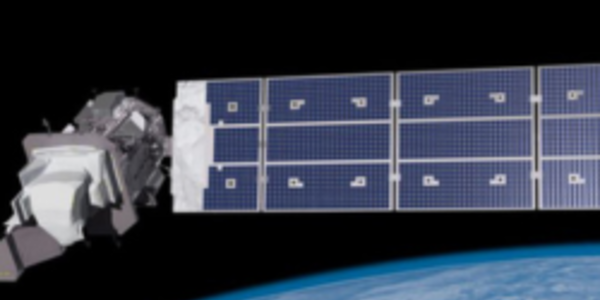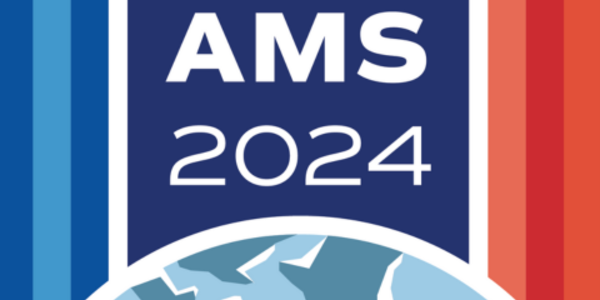
To present their work and explore emerging research on the ocean, several of our scientists and staff are attending the 2018 Ocean Sciences Meeting (OSM) from February 11 through February 16 at the Oregon Convention Center in Portland, Oregon. This international meeting brings together scientists, educators, students, and other professionals for scientific exchanges about all aspects of marine sciences and oceanography.
Check out the topics below to learn more about some of the products and services that our scientists are highlighting at the meeting. Follow #OSM18 and #NCEIatOSM on social media for more updates on the Ocean Sciences Meeting and our contributions to it.
The meeting is co-sponsored by the American Geophysical Union, the Association for the Sciences of Limnology and Oceanography, and The Oceanography Society.
Visit the NOAA NCEI Booth
We’ll be at the NOAA NCEI booth (#313) at the 2018 Ocean Sciences Meeting from 9:30 AM to 6:00 PM PT Tuesday through Thursday, so stop by and visit. NCEI oceanographers, meteorologists, and other scientists will be available to talk with you and answer any questions you may have about our ocean-related products and services.
Join Us for a Town Hall and Q&A
On Monday, February 12, NCEI will lead a Town Hall and Q&A focusing on NCEI’s mission as a data archive as well as showcasing the latest developments in our products and services. The Town Hall will take place from 12:45 PM to 1:45 PM PT at the Oregon Convention Center, room E143–E144. The event opens a dialogue directly with our scientists and leadership for those interested in our coastal, ocean, and marine data. It’s the opportunity for attendees to learn more about our archives and ask questions about data ingest to access to products. NCEI representatives will include:
- Eric A. Kihn, Director, NCEI Center for Coasts Oceans and Geophysics
- Kenneth Casey, Deputy Director, NCEI Data Stewardship Division
- Andrew Allegra, Oceanographer, NCEI Scientific Engagement
World Ocean Database
The World Ocean Database is one of the most comprehensive collections of scientific information about the oceans, with records dating back as far as 1773. In addition to a wide array of temperature and salinity observations, the database captures other measurements including oxygen, nutrients, pH, and chlorophyll, which help scientists reveal the chemical, physical, and biological structure of the world's oceans.
Check out our OSM talks, posters, and presentations for opportunities to learn more about our commitment to stewarding and providing access to ocean data.
Global Temperature and Salinity Profile Program Database
The Global Temperature and Salinity Profile Program (GTSPP) is a cooperative international project that provides timely access to the high-quality, high-resolution global temperature and salinity data for operational forecasting and climate research. The GTSPP also implements internationally agreed upon quality control mechanisms and data management techniques. In cooperation with the GTSPP, we maintain an online database of the program’s global ocean data.
Check out our OSM talks, posters, and presentations for opportunities to learn more about our efforts to make high-quality ocean data accessible to the international community.
Gulf of Mexico Data Atlas
The Gulf of Mexico Data Atlas provides information on the physical environment, marine resources, and economic activity in the Gulf with data from Alabama, Florida, Louisiana, Mississippi, Texas, Cuba, and Mexico. With this digital atlas, you can view maps of bathymetry, climatology, living marine resources, economic activity, jurisdictions, and more.
Check out our OSM talks, posters, and presentations for opportunities to learn more about the coastal and ocean environment in the Gulf.
Water Column Sonar Data
NOAA fishery survey vessels as well as academic and international fleets collect water column sonar data at a variety of locations across the ocean. These data contain acoustic scattering information from near the surface down to the seafloor. NCEI receives these data, ensures their long-term preservation, and provides worldwide access to them. Scientists use these data to assess physical and biological characteristics of the ocean, including the spatial distribution of plankton, fish, methane seeps, and underwater oil plumes.
Check out our OSM talks, posters, and presentations for opportunities to learn more about applications for sonar data.
Blended Sea Winds
Our Blended Sea Winds dataset provides high-resolution six-hourly, daily, and monthly wind speeds over the world’s oceans at 10-meter height. The dataset blends observations from up to six different satellites to fill in data gaps and reduce errors. Scientists can use these high-resolution data to help improve forecasts of ocean and weather conditions.
Check out our OSM talks, posters, and presentations for opportunities to learn more about a wide variety of oceanic data.
NCEI Talks, Posters, and Presentations
All times listed below are in Pacific Time and all rooms are in the Oregon Convention Center.
Monday, February 12
- Town Hall, NOAA's National Centers for Environmental Information, 12:45 PM to 1:45 PM, Room E143-E144
- Poster AI14A-1568, Inter- and Intra-Basin Relationships Between Near-Surface Salinity and the Hydrological Cycle, 4:00 PM to 6:00 PM, Poster Hall
- Poster PO14B-2186, Topographic Enhancement of Diapycnal Diffusivity on the Continental Slope in the Northern Gulf of Mexico and Its Application to the Oil Droplet Dynamics, 4:00 PM to 6:00 PM, Poster Hall
Tuesday, February 13
- Session, Tracking Ocean Heat Content and Its Role in Earth's Climate Variability and Change I, 8:00 AM to 10:00 AM, Oregon Ballroom 204
- Poster Session PC24C, Tracking Ocean Heat Content and Its Role in Earth's Climate Variability and Change II, 4:00 PM to 6:00 PM, Poster Hall
- Poster EP24C-0800, Application of Satellite and Acoustic Remote Sensing Data to Characterize the Spatial Distribution of Marine Life, 4:00 PM to 6:00 PM, Poster Hall
- Poster ED24B-2362, Ocean Sciences and Social Media: Building an Audience, 4:00 PM to 6:00 PM, Poster Hall
Wednesday, February 14
- Poster Session OD34A, Data Rescue and Synthesis for Climate and Environmental Science I, 4:00 PM to 6:00 PM, Poster Hall
- Poster OD34A-2750, New High-Resolution Regional Climatologies for the North Pacific Ocean, 4:00 PM to 6:00 PM, Poster Hall
- Poster OD34A-2749, Comparison of Two In Situ-Derived Oceanographic Climatologies: World Ocean Atlas 2013 and Global Ocean Data Analysis Project Version 2, 4:00 PM to 6:00 PM, Poster Hall
- Poster IS34D-2656, Ocean Circulation’s Induced Electromagnetic Temporal Variations, 4:00 PM to 6:00 PM, Poster Hall
Thursday, February 15
- Session Talk, The World Ocean Database: Historic and Recent Ocean Profile Data for Oceanography and Climate Studies, 10:30 AM to 10:45 AM, Room E143-E144
- Session Talk, Integrated Marine Surface Data Collection and Datasets Production and Services at NOAA NCEI, 11:00 AM to 11:15 AM, Room E143-E144
- Session Talk, Underwater Acoustics Archives: Global Access to Big Data, 11:15 AM to 11:30 AM, Room E143-E144
- Session, Data Rescue and Synthesis for Climate and Environmental Science II, 2:00 PM to 4:00 PM, Room F151
- Session Talk, International Quality Controlled Ocean Database (IQuOD) Version 0.1, 2:00 PM to 2:15 PM, Room F151
- Session Talk, Rescue, Archival and Discovery of Tsunami Events on Marigrams, 3:30 PM to 3:45 PM, Room F151
- Poster Session OD44A, Big Data for a Big Ocean: Progress on Tools, Technology, and Services I, 4:00 PM to 6:00 PM, Poster Hall
- Poster OD44A-2789, PyEcholab: A Toolkit for Water Column Echosounder Data Analysis, 4:00 PM to 6:00 PM, Poster Hall
- Poster OD44A-2771, Implementation of a Global Ocean Currents Database at NOAA’s National Centers for Environmental Information, 4:00 PM to 6:00 PM, Poster Hall
- Poster PL44C-1902, Surface pH Distributions and Controlling Mechanisms in the Global Ocean, 4:00 PM to 6:00 PM, Poster Hall
- Poster HE44B-2983, Improving Arctic Sea Surface Temperature Estimates in a ~35-year Blended Analysis, 4:00 PM to 6:00 PM, Poster Hall
Friday, February 16
- Session, Big Data for a Big Ocean: Progress on Tools, Technology, and Services II, 8:00 AM to 10:00 AM, Room E143-E144
- Session Talk, Video Data Management: Ocean Exploration and Research’s Pioneering Solution to Management of Video Data and the Development of a Self-Service User Interface for Discovery and Access, 8:00 AM to 8:15 AM, Room E143-E144
- Session Talk, Managing Big Data at the NOAA National Centers for Environmental Information, 9:15 AM to 9:30 AM, Room E143-E144
- Session, Big Data for a Big Ocean: Progress on Tools, Technology, and Services III, 10:30 AM to 12:30 PM, Room E143-E144



